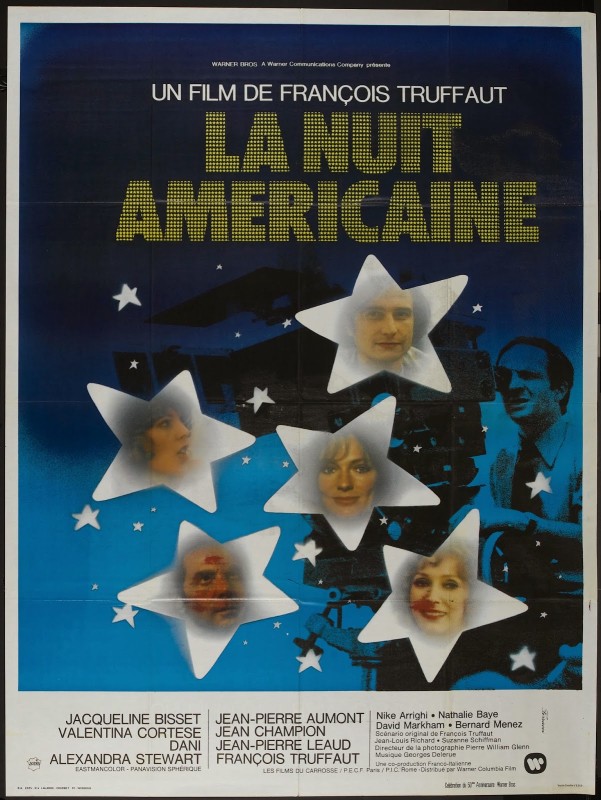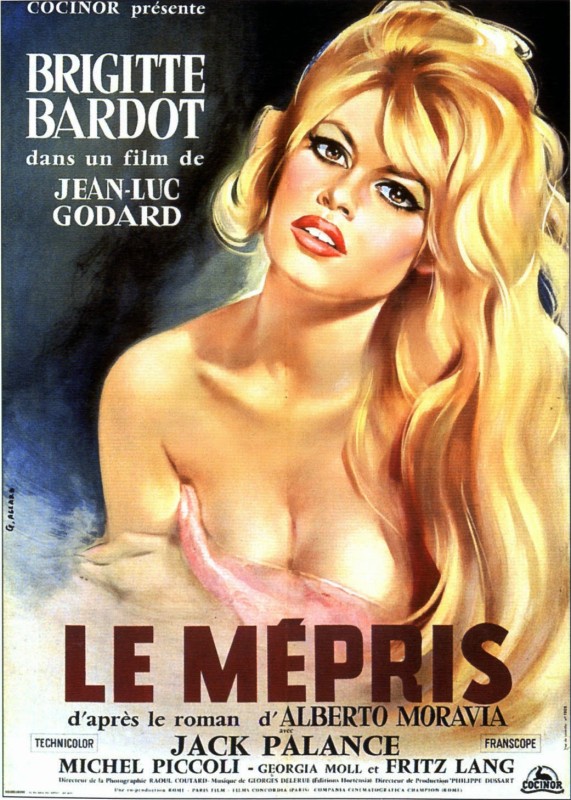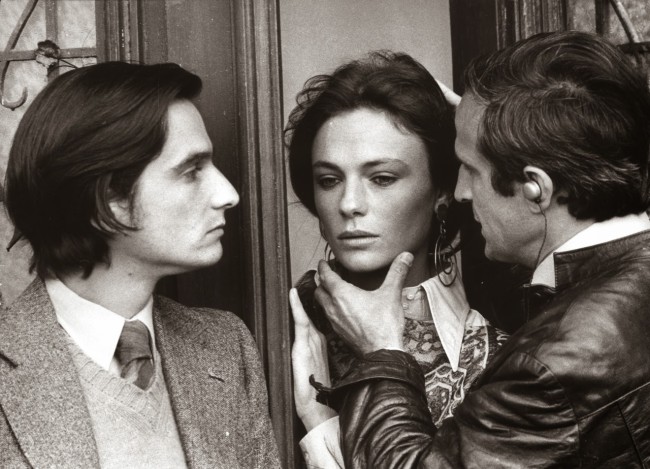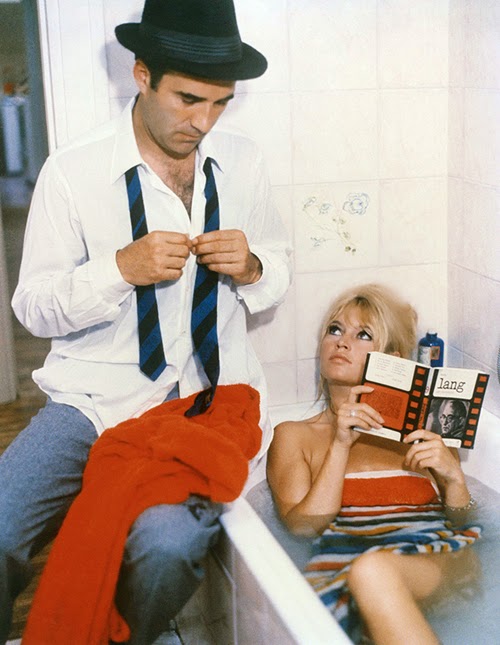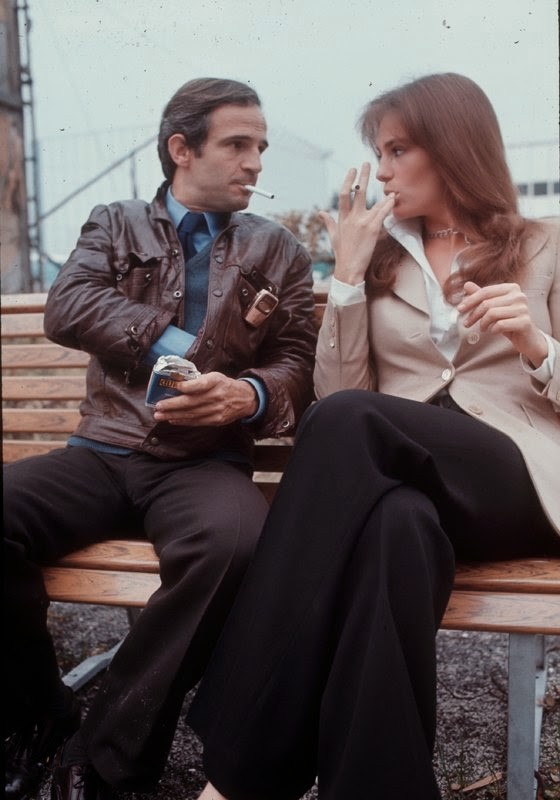By James Hancock (originally posted on my personal blog)
Cinema substitutes our gaze for a world more in harmony with our desires.
-Film Critic André Bazin (opening line to Jean-Luc Godard’s “Contempt”)
Like many hardcore film fanatics I often fantasize about what films I would program if I ever ran my own movie theater. I love theaters that celebrate films both from the past and present such as the Film Forum in Manhattan or the New Beverly in Los Angeles. The possibilities are endless but after having recently rewatched two classics of French cinema I think it would be tough to beat a double feature of Jean-Luc Godard’s “Contempt (Le mépris)” (1963) and François Truffaut’s “Day for Night (La nuit américaine)” (1973). I discovered both of these films at the perfect time, “Contempt” in the summer of 1997 and “Day for Night” in the spring of 1998, a year where I discovered more classic films than in any other year before or since. I had just finished my 2nd year at the University of Virginia when I headed out to Los Angeles to work my first of two summers as an intern for producer Sid Ganis. For the first time I was able to see old movies on a regular basis in the theater, a luxury I had never experienced growing up in the suburbs of Virginia and North Carolina. I essentially lived in movie theaters whenever I wasn’t at the office and I felt as if on a daily basis my brain was exploding and expanding as I discovered what seemed to be a limitless treasure trove of amazing movies from all over the world. Every time I opened up the LA Weekly to plan my weekly diet of cinema I felt acute anxiety over the films I would inevitably have to miss as I zigzagged back and forth across Los Angeles county in my effort to see as many classics as possible.
I learned my way around LA by hunting down every cool theater from Santa Monica to downtown Los Angeles. When it came to planning retrospectives on great directors, one of the best of these theaters was the Nuart. That summer they featured the restoration of Jean-Luc Godard’s “Contempt”, a restoration that had been supervised by Martin Scorsese who described the film as the best film about filmmaking he had ever seen. At that time I was completely ignorant of Godard’s work but I absolutely adored Scorsese, so I hit the theater at my very first opportunity. What I saw absolutely blew my mind and exposed me to the French New Wave for very first time.
I returned to UVA at the end of the summer with a borderline unhealthy movie obsession after having spent the majority of the summer in dark rooms watching movies, reading books about film history and trying to learn what I could about the industry at my internship. UVA only offered a handful of classes about film but there was a class about French Cinema that I eagerly signed up for and absolutely loved. We studied some incredible filmmakers including but not limited to Jean Cocteau, René Clair, Marcel Carné, Henri-Georges Clouzot, Jean-Pierre Melville, Jean-Luc Godard and François Truffaut. Toward the end of the class we watched what has become my favorite fictional film about filmmaking I’ve ever seen, François Truffaut’s “Day for Night”. The copy of the movie was total garbage. The movie was on VHS in pan & scan, dubbed in English, but in spite of the crappy format I found the movie as distinctive and original as “Contempt”. “Day for Night” is the complete opposite of “Contempt” in tone and style and is one of those movies that makes me so happy when I’m watching it that my forearms get covered in goosebumps. Luckily I have since been able to find the movie in its proper format, widescreen and in French, which only increases the film’s power.
Now I won’t pretend to be an expert on French culture. Outside of my knowledge of French Film History my knowledge of France is laughably incomplete. But in spite of my cultural ignorance I have to say that it would be tough to find a better introduction to French cinema than watching these two films back to back. Both filmmakers began their careers as film critics completely under the spell movies and the great masters of the medium. As they graduated from writing to filmmaking, Godard and Truffaut developed completely different approaches to storytelling but with both of these movies, they’ve crafted their own version of a love song to the language of cinema and the struggles that are involved in making movies. Both directors make a variety of references to filmmakers they admire in their respective movies, and I would argue that studying these filmmakers’ heroes would build the perfect foundation for anyone interested in learning about film history. Both movies also feature directors playing directors, Fritz Lang as himself in “Contempt” and François Truffaut as Director Ferrand in “Day for Night”. A large part of the power of these movies stems from their musical scores, which as it turns out were both composed by the same man, Georges Delerue. Depending on what type of films one enjoys, opinions will vary on which of the two films is the superior. I have room in my heart for both and simply want to introduce these movies to people that are unfamiliar with them. Without going into too much detail and ruining the films for newcomers, I want to call attention to a few interesting details in both of these movies that viewers might find interesting.
Contempt (1963)
“Contempt” is the story of a writer played by Michel Piccoli and how his marriage to his wife, played by the exquisite Brigitte Bardot, falls apart when he considers taking a job to rewrite an adaptation of Homer’s “Odyssey”. The film features Jack Palance as a tyrannical American film producer and as I mentioned earlier, legendary filmmaker Fritz Lang as himself directing “The Odyssey” in Italy. The story is great and features some of the most arousing nude photography of Bardot ever recorded, but for fans of film history, “Contempt” has more hidden easter eggs than any other film I’ve seen. I just watched the movie again before writing this post and I’m still discovering new hidden nuggets. The majority of these references escaped me the first time I saw the movie back in ’97 but now I have an absolute blast searching for these references that celebrate German, American, French and Italian cinema. If you watch closely, there are movie posters for films by Howard Hawks, Alfred Hitchock, Roberto Rossellini in addition to the overt dialogue about directors such as Fritz Lang, Nicholas Ray, D.W. Griffith, and Charlie Chaplin. The best reference to a filmmaker in the movie is a line by cinema pioneer Louis Lumière written in Italian on the wall of the screening room where the “Odyssey” production team screens their dailies. In spite of basically inventing the medium, the line by Lumière reads, “The cinema is an invention without a future,” which apparently Lumière told fellow pioneer Georges Méliès when he was inquiring about the technology. These references aren’t crucial to one’s enjoyment of the movie, but are icing on the cake for hardcore movie fans. All references aside, this is film is a fascinating tragedy shot gorgeously in CinemaScope and one that lovers of film will find endlessly rewarding upon multiple viewings.
Before I wrap up, the character of the script girl Joelle played by Nathalie Baye deserves a special mention. She’s the type of person that every filmmaker wishes filled every role on their crew. In for a penny in for a pound, she is the hardest working person on the movie, routinely pulling all nighters to solve problems such as searching for missing wardrobe or rewriting the script with the director. When she hears that her apprentice has run off with an English stuntman, effectively breaking the heart of movie star Alphonse who she’s been sleeping with, Joelle exclaims, “With the stuntman! I’d drop a guy for a film. I’d never drop a film for a guy.”
In closing I want to reference a scene that for me seems to capture perfectly François Truffaut’s personal feelings about devoting his life to the wild and unpredictable world of filmmaking. Jean-Pierre Léaud’s character Alphonse, who plays the male lead in the movie within the movie, is having an emotional breakdown from a broken heart and stumbles into their hotel hallway to ask some crew members for money to go to a whorehouse. Truffaut gently guides him back to his room and explains, “Come on, Alphonse. Go back to your room, re-read the script, learn your lines, then try to sleep. Tomorrow we work. That’s what matters. Don’t be a fool. You’re a very good actor. No one’s private life runs smoothly. That only happens in the movies. No traffic jams, no dead periods. Movies go along like trains in the night. And people like you and me are only happy in our work. I’m counting on you.” It is the kind of moment that defines Truffaut’s career on so many levels and leaves us hungry to watch more of his movies.


